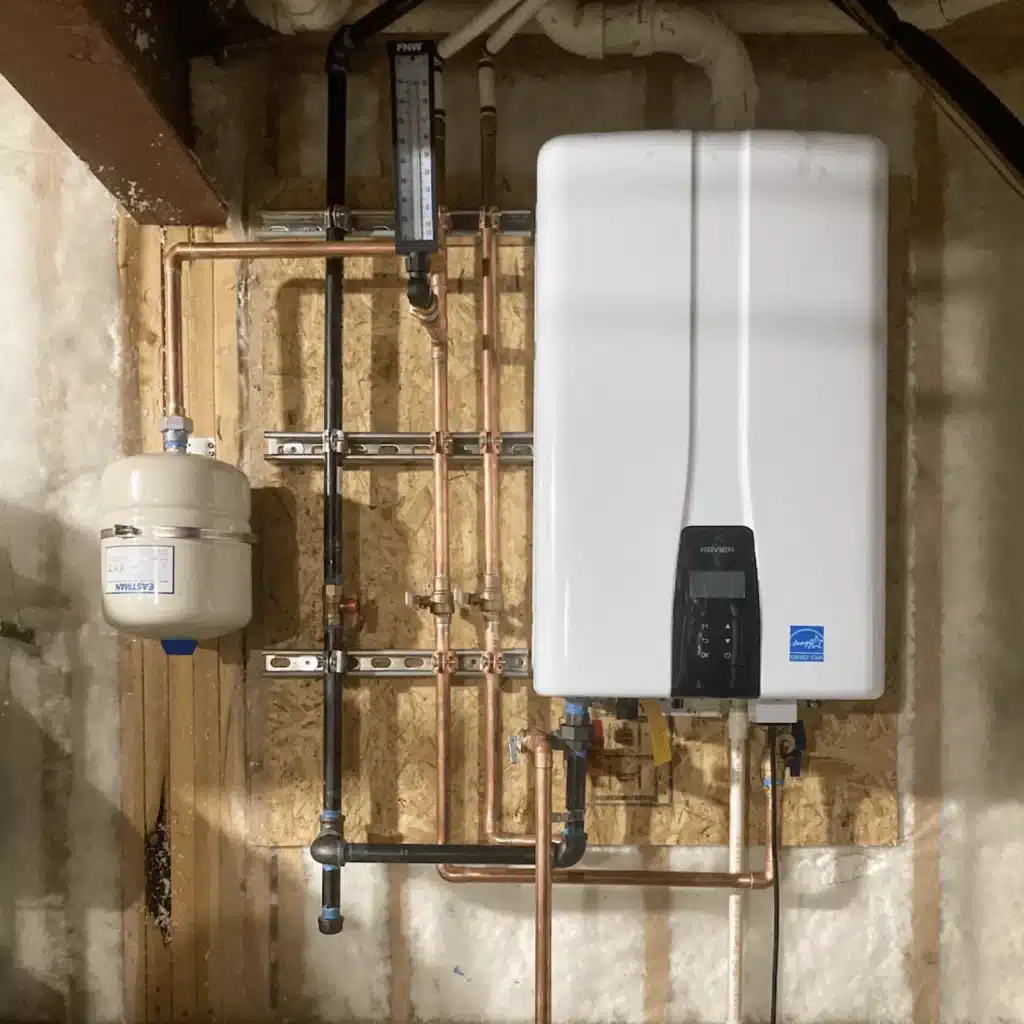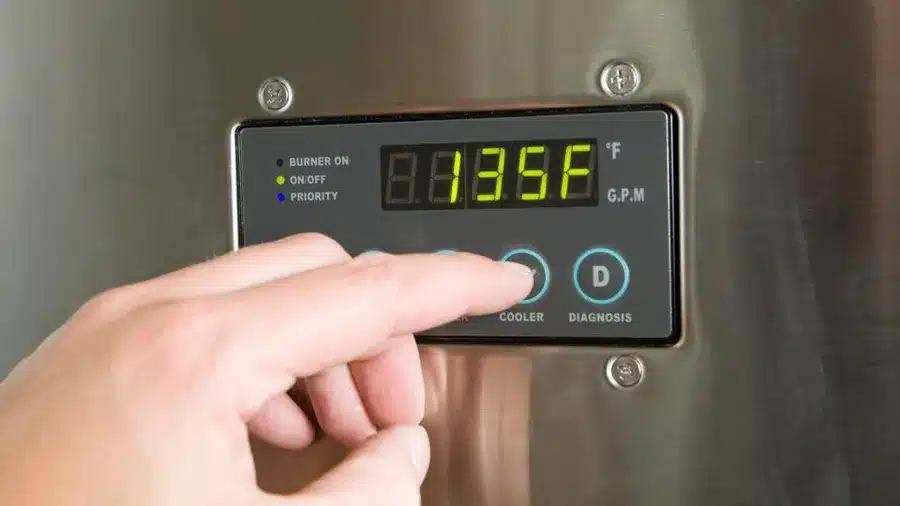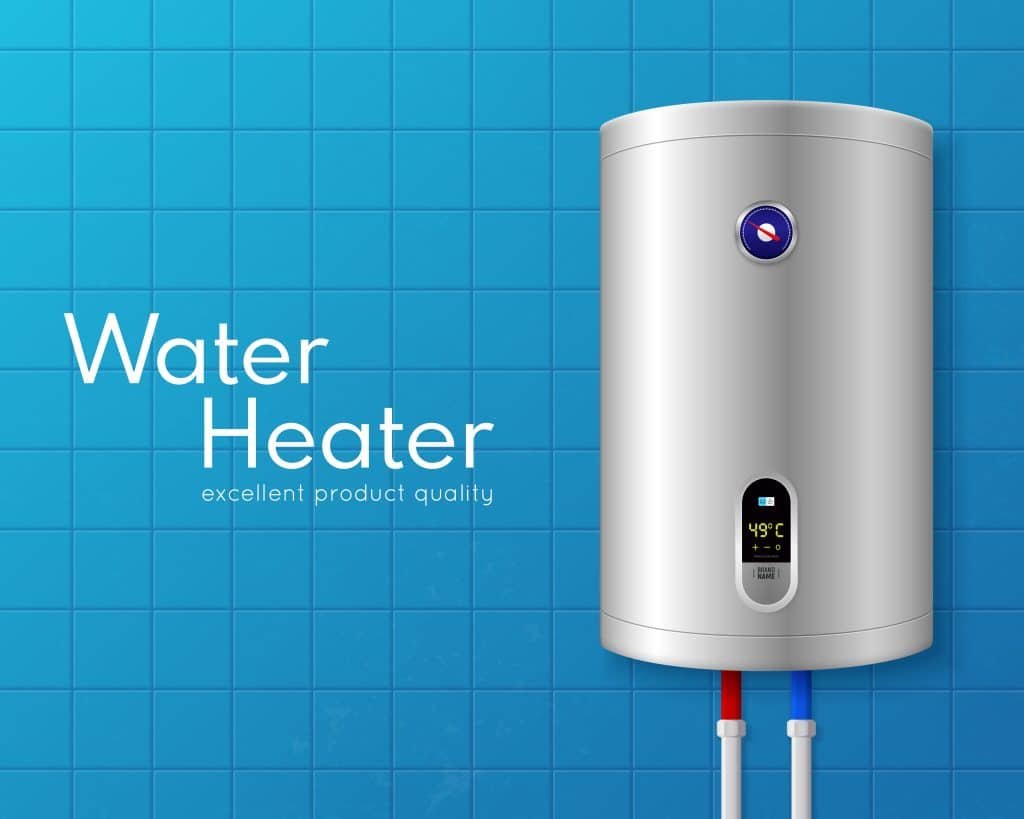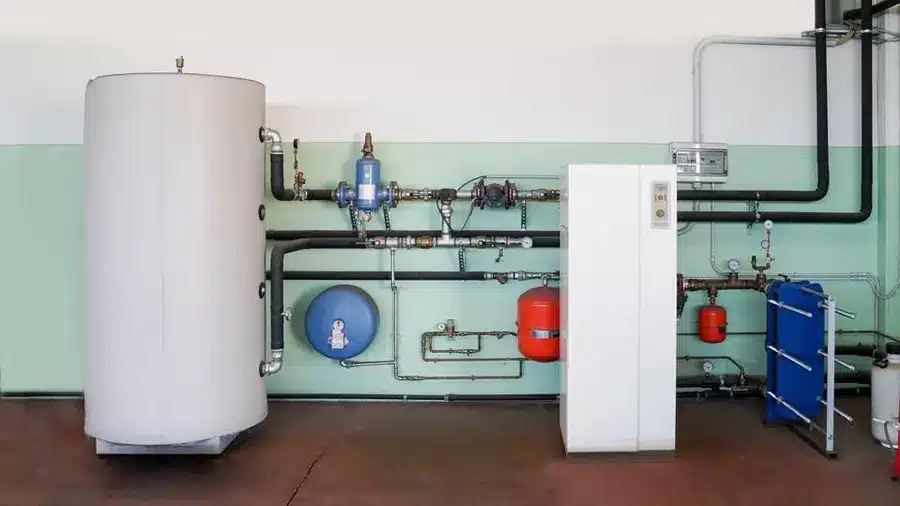Water Heater Efficiency: Step into the future of home appliances with tankless marvels transforming hot water experiences. As homeowners prioritize energy efficiency, on-demand water heaters gain prominence, promising savings and continuous hot water. This comprehensive guide delves into their efficiency, workings, advantages, drawbacks, ensuring you make informed choices for a sustainable, energy-smart home.
How Tankless Water Heaters Work:
To understand the efficiency of tankless water heaters, it’s crucial to grasp their operational principles. Unlike traditional tank water heaters that store and constantly heat a large volume of water, tankless water heaters heat water on demand. When a hot water tap is turned on, cold water travels through a pipe into the unit, where either an electric element or a gas burner heats the water instantaneously. This process eliminates the need for a storage tank and the continuous energy consumption associated with keeping the water hot.
Energy Efficiency Advantages:
Reduced Energy Consumption:
Tankless water heaters are renowned for their energy efficiency. Traditional tank heaters must maintain a consistent temperature in the tank, leading to standby heat loss. In contrast, tankless heaters only activate when hot water is needed, eliminating standby losses and reducing overall energy consumption.
Longevity:
Tankless water heaters tend to have a longer lifespan compared to traditional tanks. With proper maintenance, tankless units can last up to 20 years, contributing to a more sustainable and environmentally friendly solution.
Modulation Technology:
Many modern tankless water heaters incorporate advanced modulation technology. This technology allows the unit to adjust its power output based on the water flow rate, ensuring precise temperature control and minimizing energy usage.
Federal Tax Credits and Incentives:
In some regions, homeowners may qualify for federal tax credits or local incentives when installing a tankless water heater. These financial incentives are often aimed at promoting energy-efficient solutions, making tankless water heaters a cost-effective option for many.
Continuous Hot Water Supply:
No Waiting Time:
One of the primary advantages of tankless water heaters is the absence of a storage tank. This means there’s no waiting time for the water to heat up, providing a continuous and instant supply of hot water whenever needed.
High Flow Rates:
Tankless water heaters are designed to handle high flow rates, making them suitable for homes with multiple hot water demands simultaneously, such as running a dishwasher while someone takes a shower.
Potential Drawbacks for Water Heater Efficiency :
Initial Cost:
While tankless water heaters offer long-term energy savings, the initial cost of purchasing and installing these units can be higher compared to traditional tank heaters. Homeowners should consider this factor in relation to their budget and anticipated long-term savings.
Installation Complexity for Water Heater Efficiency:
Installing a tankless water heater may require modifications to the existing plumbing and electrical or gas systems. This can add to the overall installation cost and may necessitate professional installation services.
Cold Water Sandwich Effect:
Some users report experiencing a phenomenon known as the “cold water sandwich effect” with tankless water heaters. This occurs when there’s a brief burst of cold water between two periods of hot water, typically during intermittent use. However, advancements in technology aim to mitigate this issue.
Tips for Maximizing Water Heater Efficiency:
Proper Sizing:
Choosing the right-sized tankless water heater is crucial for optimal efficiency. A unit that is too small may struggle to meet demand, while an oversized unit may waste energy. Consultation with a professional can help determine the appropriate size for your household.
Regular Maintenance:
Periodic maintenance is essential to ensure the continued efficiency of a tankless water heater. Flushing the system to remove mineral deposits and checking for any issues will contribute to its longevity and performance.
Insulate Hot Water Pipes:
Insulating hot water pipes can help minimize heat loss as water travels from the heater to the faucet, ensuring that the water remains hot and reducing the need for the unit to work harder.
Environmental Impact:
Reduced Carbon Footprint:
The energy efficiency of tankless water heaters translates into a reduced carbon footprint. By minimizing energy consumption and utilizing advanced technologies, these units contribute to lower greenhouse gas emissions compared to traditional tank heaters.
Energy Star Certification:
Many tankless water heaters carry the Energy Star certification, a designation awarded to products that meet stringent energy efficiency guidelines. Choosing an Energy Star-certified unit ensures that the appliance adheres to high standards of performance and environmental impact.
Regional Considerations:
Climate Impact:
The efficiency of tankless water heaters may vary depending on the climate of the region. In colder climates, where incoming water is colder, tankless units may need to work harder to achieve the desired temperature. Understanding the impact of climate on efficiency is crucial for homeowners considering this technology.
Altitude Effects:
The efficiency of gas-powered tankless water heaters can be influenced by altitude. At higher elevations, the reduced oxygen levels may affect combustion, potentially requiring adjustments or specialized units designed for elevated locations.
Technology Innovations:
Condensing Technology:
Some tankless water heaters feature condensing technology, which extracts additional heat from exhaust gases. This technology increases overall efficiency by utilizing heat that would otherwise be wasted, further enhancing energy savings.
Smart Controls and Connectivity:
The integration of smart controls allows users to monitor and control their tankless water heaters remotely. Smart technology enables features such as scheduling, temperature adjustments, and diagnostics, optimizing efficiency and providing homeowners with greater control over their energy usage.
Comparative Analysis with Traditional Tanks:
Energy Savings Comparison:
Numerous studies and comparisons have been conducted to evaluate the energy savings of tankless water heaters against traditional tank systems. These analyses consistently demonstrate the superior energy efficiency of tankless units over the long term.
Total Cost of Ownership:
While the upfront cost of tankless water heaters may be higher, considering the total cost of ownership over the lifespan of the unit reveals the potential for substantial savings in energy bills, maintenance, and replacement costs.
User Satisfaction and Reviews:
Real-world Experiences:
User reviews and testimonials offer valuable insights into the efficiency of tankless water heaters in real-world scenarios. Examining feedback from homeowners who have installed and used these systems provides a practical perspective on their performance, reliability, and overall satisfaction.
Potential for Energy-Efficiency Programs:
Some regions offer energy-efficiency programs that provide incentives for homeowners to switch to tankless water heaters. These programs may include rebates, grants, or subsidized installation costs, further encouraging the adoption of energy-efficient technologies.
Water Heater Maintenance and Longevity:
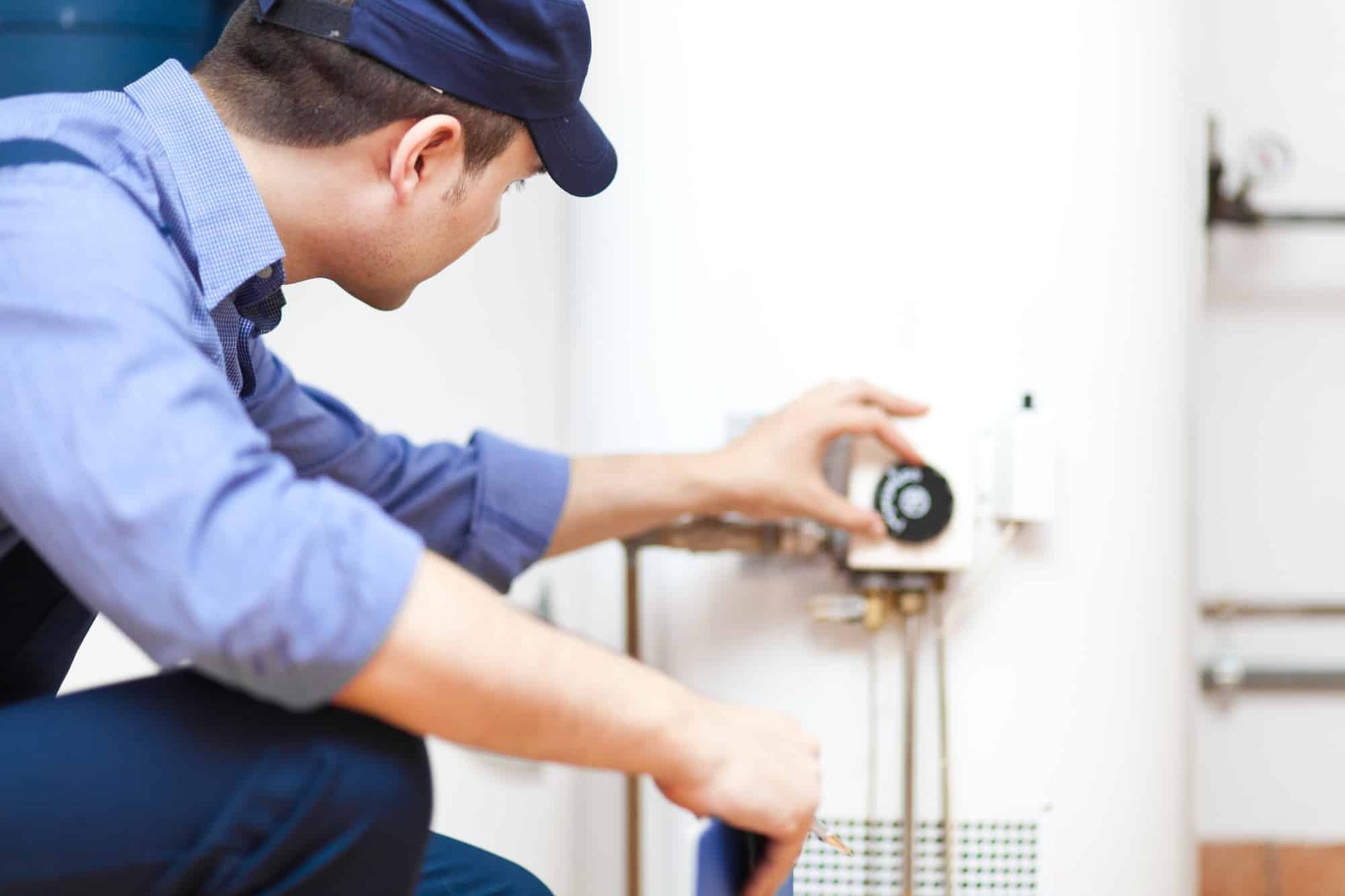
Descaling Procedures:
Tankless water heaters may accumulate mineral deposits over time, affecting efficiency. Regular descaling procedures, depending on water hardness levels, are essential to maintain optimal performance and prevent clogs in the heat exchanger.
Annual Professional Inspections:
Periodic professional inspections by certified technicians can identify potential issues before they escalate. This proactive approach to maintenance can extend the lifespan of the unit and ensure consistent efficiency.
Water Quality Considerations:
Water Softening Systems:
In areas with hard water, the use of water softening systems can contribute to the efficiency of tankless water heaters by reducing mineral buildup. Softened water helps maintain the heat exchanger’s effectiveness and prevents scaling.
Filtration Systems:
Installing water filtration systems can improve water quality by removing impurities. Cleaner water not only enhances the performance of the tankless water heater but also contributes to the longevity of plumbing fixtures and appliances throughout the household.
Integrated Recirculation Systems:
Hot Water Recirculation:
Tankless water heaters can be paired with hot water recirculation systems to minimize the time it takes for hot water to reach the faucets. This technology reduces water wastage and ensures a more efficient use of energy by maintaining a constant temperature in the hot water lines.
Demand-Activated Recirculation:
Some tankless water heaters feature demand-activated recirculation systems that only operate when hot water is requested. This approach further optimizes energy usage by avoiding continuous recirculation, balancing comfort and efficiency.
Hybrid Water Heater Options:
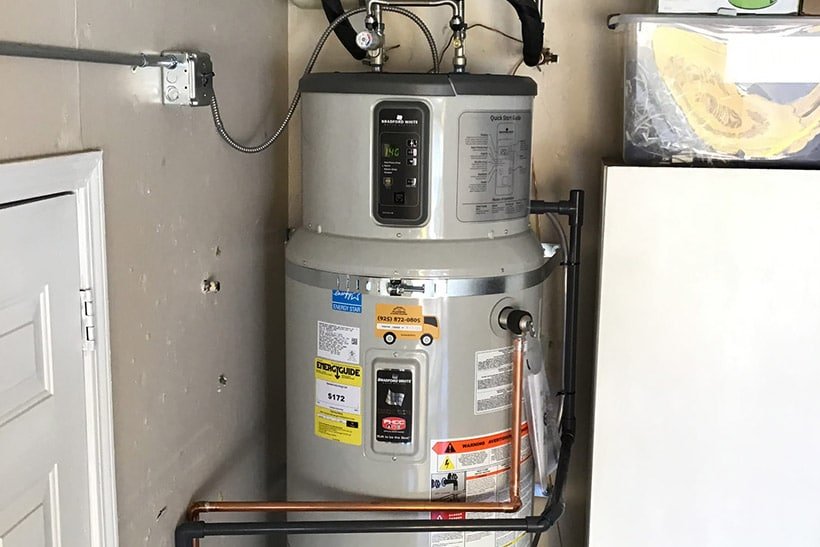
Combining Technologies:
Hybrid water heaters combine elements of tankless technology with a small storage tank. This hybrid approach aims to address potential drawbacks such as the cold water sandwich effect and provide a compromise between the continuous hot water supply of tankless units and the buffer capacity of traditional tanks.
Hybrid Heat Pump Systems:
Heat pump water heaters, which extract heat from the air or ground, can be integrated with tankless systems. This hybrid configuration maximizes energy efficiency by utilizing renewable energy sources, offering a sustainable solution for homeowners.
Energy Efficiency Standards:
Industry Standards and Ratings:
Various organizations establish standards and ratings for energy-efficient appliances. Understanding these standards, such as Uniform Energy Factor (UEF) for water heaters, can aid consumers in comparing the efficiency of different tankless models and making informed decisions.
Technological Advancements:
Ongoing research and development in the field of water heating technology lead to continuous improvements in efficiency. Keeping abreast of technological advancements can guide consumers toward the latest innovations that offer enhanced energy savings.
Conclusion:
As technology evolves and consumer demands drive innovation, the efficiency of tankless water heaters continues to improve. From routine maintenance practices to considerations of water quality and innovative hybrid configurations, homeowners have a range of options to optimize the performance and longevity of their tankless systems. By staying informed about these factors and embracing advancements in water heating technology, individuals can make choices that not only save energy and reduce costs but also contribute to a more sustainable and comfortable living environment. The efficiency of tankless water heaters is a dynamic landscape, shaped by ongoing research, user experiences, and a commitment to environmentally conscious solutions.
for more articles VISIT NOW!

